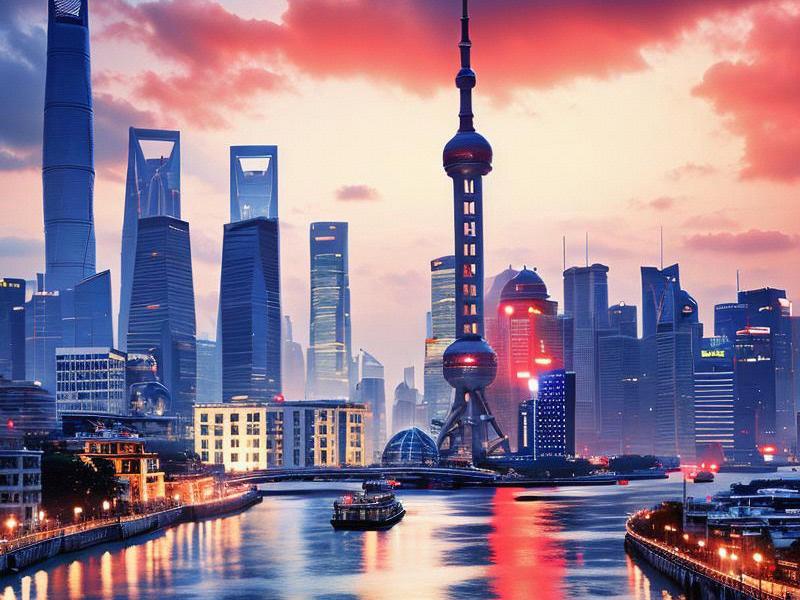
Shanghai, often referred to as the "Pearl of the Orient," stands as a beacon of China's modernization and a testament to the country's remarkable economic and social progress. This vibrant metropolis, located on the eastern coast of China, is not only the largest city in the country but also one of the most dynamic and influential urban centers in the world.
The story of Shanghai's transformation is nothing short of extraordinary. Once a modest fishing village, it has risen to prominence as a global financial hub, a cultural melting pot, and a symbol of China's economic might. This remarkable journey is a testament to the city's resilience, adaptability, and innovative spirit.
One of the most striking aspects of Shanghai is its economic prowess. As the financial capital of China, Shanghai is home to the country's two major stock exchanges and a plethora of multinational corporations. The city's Pudong district, in particular, has emerged as a global financial center, with its skyline dominated by iconic skyscrapers such as the Oriental Pearl Tower, the Jin Mao Tower, and the Shanghai Tower.
The bustling Bund, located on the opposite side of the Huangpu River, offers a glimpse into the city's colonial past. Once the hub of foreign trade and commerce, the Bund is now lined with grandiose buildings that reflect the architectural styles of the early 20th century. Today, it serves as a popular tourist destination, offering stunning views of the modern skyline across the river.
Shanghai's economic success is not limited to its financial sector. The city is also a major hub for trade, manufacturing, and technology. Its well-developed infrastructure, including its extensive network of highways, railways, and airports, makes it a key player in global trade and commerce. The city's port, the Port of Shanghai, is one of the busiest in the world, handling millions of containers annually.
夜上海419论坛 Beyond its economic achievements, Shanghai is a city of culture and creativity. It is home to a diverse population, with over 24 million residents from all corners of China and the world. This cultural diversity is reflected in the city's vibrant arts scene, which includes world-class museums, theaters, and music venues. The Shanghai Museum, for example, is renowned for its extensive collection of Chinese art, while the Shanghai Grand Theatre hosts a wide range of performances, from opera to contemporary dance.
The city's culinary scene is another testament to its cultural richness. Shanghai cuisine, known for its delicate flavors and intricate presentation, is a highlight for food lovers. From traditional dishes such as xiaolongbao (soup dumplings) and shengjianbao (pan-fried buns) to modern fusion cuisine, Shanghai offers a culinary experience that is both authentic and innovative.
Shanghai's urban development is a marvel of modern engineering and design. The city has undergone rapid transformation in recent decades, with new skyscrapers, shopping malls, and residential complexes springing up across the city. The Pudong New Area, in particular, is a showcase of modern urban planning, with its futuristic skyline and state-of-the-art infrastructure.
However, Shanghai's urban development is not without its challenges. The city faces issues such as traffic congestion, air pollution, and housing shortages. To address these challenges, the government has implemented various measures, including the expansion of public transportation, the promotion of green initiatives, and the development of affordable housing projects.
上海龙凤419贵族 Despite these challenges, Shanghai remains a city of opportunities. It is a place where innovation and entrepreneurship thrive, attracting talent from all over the world. The city's business-friendly environment, coupled with its strategic location, makes it an ideal destination for companies looking to expand their operations in China.
Shanghai's historical heritage is another aspect that sets it apart. The city has a rich history that dates back thousands of years, with evidence of human settlement found in the area as early as the Neolithic period. Throughout its history, Shanghai has been influenced by various cultures, including the Chinese, the British, the French, and the Japanese.
The city's colonial past is evident in its architecture and cultural institutions. The French Concession, for example, is a charming area filled with cobblestone streets, art deco buildings, and cafes. It offers a glimpse into the city's colonial era and is now a popular spot for both locals and tourists.
Efforts have been made to preserve Shanghai's historical heritage while embracing modern development. The city has designated several historic districts, such as the Old City and the Former French Concession, as protected areas. These districts are home to a mix of traditional and modern architecture, creating a unique blend of old and new.
上海私人外卖工作室联系方式 In recent years, Shanghai has also made significant strides in environmental sustainability. The city has set ambitious goals to reduce carbon emissions, improve air quality, and promote green energy. Initiatives such as the construction of green buildings, the expansion of public transportation, and the promotion of cycling have contributed to a more sustainable urban environment.
Shanghai's role in global affairs is also noteworthy. The city has hosted numerous international events, including the World Expo in 2010, which attracted millions of visitors from around the world. These events have showcased Shanghai's ability to host large-scale international gatherings and its commitment to global cooperation.
As Shanghai continues to grow and evolve, it remains a symbol of China's rise as a global power. The city's success story is a source of inspiration for many, demonstrating the potential of urbanization and economic development. At the same time, it serves as a reminder of the challenges that come with rapid growth, such as balancing economic progress with environmental sustainability and social equity.
In conclusion, Shanghai is a city of contrasts and complexities, where the old and the new coexist in harmony. It is a place of endless charm and opportunities, offering a unique blend of history, culture, and modernity. As the city looks to the future, it continues to be a vital part of China's journey towards becoming a global leader.
